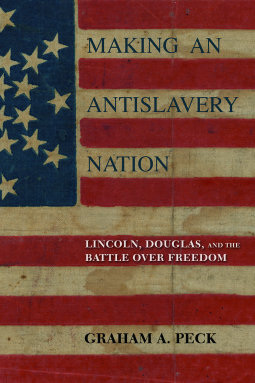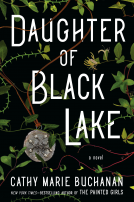Please wait... This may take a moment.
Making an Antislavery Nation
Lincoln, Douglas, and the Battle over Freedom
This title was previously available on NetGalley and is now archived.
Pub Date
Oct 09 2017
| Archive Date
Sep 13 2017
Description
This sweeping narrative presents an original and compelling explanation for the triumph of the antislavery movement in the United States prior to the Civil War. Abraham Lincoln's election as the first antislavery president was hardly preordained. From the country's inception, Americans had struggled to define slavery's relationship to freedom. Most Northerners supported abolition in the North but condoned slavery in the South, while most Southerners denounced abolition and asserted slavery's compatibility with whites' freedom. On this massive political fault line hinged the fate of the nation. Graham A. Peck meticulously traces the conflict over slavery in Illinois from the Northwest Ordinance in 1787 to Lincoln's defeat of his arch-rival Stephen A. Douglas in the 1860 election. Douglas's attempt in 1854 to persuade Northerners that slavery and freedom had equal national standing stirred a political earthquake that brought Lincoln to the White House. Yet Lincoln's framing of the antislavery movement as a conservative return to the country's founding principles masked what was in fact a radical and unprecedented antislavery nationalism. It justified slavery's destruction but triggered Civil War. Presenting pathbreaking interpretations of Lincoln, Douglas, and the Civil War's origins,
Making an Antislavery Nation shows how battles over slavery paved the way for freedom's triumph in America.
Graham A. Peck is a professor of History at Saint Xavier
University in Chicago. He is the writer, director, and producer of Stephen A.
Douglas and the Fate of American Democracy, an award-winning documentary that
aired on PBS. His film, podcasts, and
publications are available at civilwarprof.com.
This sweeping narrative presents an original and compelling explanation for the triumph of the antislavery movement in the United States prior to the Civil War. Abraham Lincoln's election as the...
Description
This sweeping narrative presents an original and compelling explanation for the triumph of the antislavery movement in the United States prior to the Civil War. Abraham Lincoln's election as the first antislavery president was hardly preordained. From the country's inception, Americans had struggled to define slavery's relationship to freedom. Most Northerners supported abolition in the North but condoned slavery in the South, while most Southerners denounced abolition and asserted slavery's compatibility with whites' freedom. On this massive political fault line hinged the fate of the nation. Graham A. Peck meticulously traces the conflict over slavery in Illinois from the Northwest Ordinance in 1787 to Lincoln's defeat of his arch-rival Stephen A. Douglas in the 1860 election. Douglas's attempt in 1854 to persuade Northerners that slavery and freedom had equal national standing stirred a political earthquake that brought Lincoln to the White House. Yet Lincoln's framing of the antislavery movement as a conservative return to the country's founding principles masked what was in fact a radical and unprecedented antislavery nationalism. It justified slavery's destruction but triggered Civil War. Presenting pathbreaking interpretations of Lincoln, Douglas, and the Civil War's origins,
Making an Antislavery Nation shows how battles over slavery paved the way for freedom's triumph in America.
Graham A. Peck is a professor of History at Saint Xavier
University in Chicago. He is the writer, director, and producer of Stephen A.
Douglas and the Fate of American Democracy, an award-winning documentary that
aired on PBS. His film, podcasts, and
publications are available at civilwarprof.com.
Advance Praise
"Making an Antislavery Nation is an elegant and
important reinterpretation of the political battles between slavery and freedom
from the nation’s founding to the secession crisis. In focusing on Illinois,
Graham Peck brilliantly highlights the significance of the state in national
politics and of Stephen Douglas as the pivotal figure in the rise of
antislavery politics and disunion. His portrait of Douglas is unequaled in a
story that is structurally and stylistically a work of immense sophistication."--John
Stauffer, Harvard University, and author of Giants: The Parallel Lives of
Frederick Douglass and Abraham Lincoln
"Graham Peck offers a sophisticated analysis of the
forces that led to the Civil War, emphasizing how Abraham Lincoln disguised the
wolf of radical antislavery nationalism with conservative sheep’s clothing, and
how Stephen A. Douglas was gradually crushed between the upper millstone of
Southern intransigence and the nether millstone of Northern disaffection for
his toleration of slavery."--Michael Burlingame, author of Abraham
Lincoln: A Life
"The victory of Abraham Lincoln and the Republican
Party was the most significant political revolution in American history. Graham
A. Peck’s penetrating account of the politics of slavery in Illinois—at once a
key battleground state and a microcosm of the nation as a whole—offers a
powerful new interpretation of this critical moment in antebellum politics. By
fusing antislavery radicalism with American nationalism, Lincoln and the
Republicans overcame an increasingly proslavery northern Democratic Party.
Thoroughly researched and judiciously argued, Making an Antislavery Nation
changes the way we understand the triumph of the Republicans and the origins of
the Civil War."--Matthew Karp, Princeton University, and author of This
Vast Southern Empire: Slaveholders at the Helm of American Foreign Policy
"Making an Antislavery Nation is an elegant and important reinterpretation of the political battles between slavery and freedom from the nation’s founding to the secession crisis. In focusing on...
Advance Praise
"Making an Antislavery Nation is an elegant and
important reinterpretation of the political battles between slavery and freedom
from the nation’s founding to the secession crisis. In focusing on Illinois,
Graham Peck brilliantly highlights the significance of the state in national
politics and of Stephen Douglas as the pivotal figure in the rise of
antislavery politics and disunion. His portrait of Douglas is unequaled in a
story that is structurally and stylistically a work of immense sophistication."--John
Stauffer, Harvard University, and author of Giants: The Parallel Lives of
Frederick Douglass and Abraham Lincoln
"Graham Peck offers a sophisticated analysis of the
forces that led to the Civil War, emphasizing how Abraham Lincoln disguised the
wolf of radical antislavery nationalism with conservative sheep’s clothing, and
how Stephen A. Douglas was gradually crushed between the upper millstone of
Southern intransigence and the nether millstone of Northern disaffection for
his toleration of slavery."--Michael Burlingame, author of Abraham
Lincoln: A Life
"The victory of Abraham Lincoln and the Republican
Party was the most significant political revolution in American history. Graham
A. Peck’s penetrating account of the politics of slavery in Illinois—at once a
key battleground state and a microcosm of the nation as a whole—offers a
powerful new interpretation of this critical moment in antebellum politics. By
fusing antislavery radicalism with American nationalism, Lincoln and the
Republicans overcame an increasingly proslavery northern Democratic Party.
Thoroughly researched and judiciously argued, Making an Antislavery Nation
changes the way we understand the triumph of the Republicans and the origins of
the Civil War."--Matthew Karp, Princeton University, and author of This
Vast Southern Empire: Slaveholders at the Helm of American Foreign Policy
Available Editions
| EDITION |
Hardcover |
| ISBN |
9780252041365 |
| PRICE |
$34.95 (USD)
|
| PAGES |
288
|
Additional Information
Available Editions
| EDITION |
Hardcover |
| ISBN |
9780252041365 |
| PRICE |
$34.95 (USD)
|
| PAGES |
288
|
Average rating from 12 members
Featured Reviews
 Michael G, Reviewer
Michael G, Reviewer
4 stars
4 stars
4 stars
4 stars
4 stars
Graham Peck in Making an Anti-Slavery Nation while talking about slavery in the United States is also talking more generally about slavery in Illinois and the political problems that it created for politicians. Illinois is even today a divided state between North-South, but this divide was particularly pronounced over slavery in the 1800’s. Peck takes the reader through the political and economic reasons why slavery endured, even though many people in the northern part of the state may not have personally wanted it.
Making an Anti-Slavery Nation takes the reader through this complex political game played most specifically by Lincoln and Stephen Douglas of on one hand being less than a slavery cheerleader, while yet still needing the Southern Illinois vote, for many of whom, slavery was a way of life and a birthright. This delicate dance had some unfortunate results. I learned a lot because Illinois proved to be the perfect battleground over slavery.
4 stars
4 stars
4 stars
4 stars
4 stars
 R W, Reviewer
R W, Reviewer
4 stars
4 stars
4 stars
4 stars
4 stars
Illinois has a specific history that makes its journey through the early days of the Union and its relationship to slavery very unique. Peck covers all the angles from the colonial aftermath to the economic infrastructure. The thing that amazes me is the inherent acceptability of slavery in general and how it is explained away through twisted morality and economics. A useful book in getting a feel for an emerging nation.
4 stars
4 stars
4 stars
4 stars
4 stars
 Liliyana S, Reviewer
Liliyana S, Reviewer
5 stars
5 stars
5 stars
5 stars
5 stars
I've actually already recommended this book to a few friends. It's brilliantly written and dives into the parts of history that are often lost in standard history textbooks. I found this book to be engaging, well-written, facts presented nicely without feeling like an information dump, and overall an enjoyable and enlightening read.
5 stars
5 stars
5 stars
5 stars
5 stars
Readers who liked this book also liked:

 Michael G, Reviewer
Michael G, Reviewer
 R W, Reviewer
R W, Reviewer







